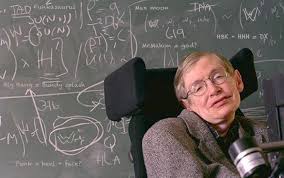Stephen Hawking, amazing physicist, dies at 76
Stephen Hawking, amazing physicist, dies at 76
Stephen Hawking, one of the world's premier hypothetical physicists, has passed on at age 76. On the front of the Oxford Dictionary of Scientists, Hawking showed up with Einstein and Madame Curie, an adept exhibit of his eminence.
For quite a long time, Hawking was restricted to a wheelchair by a type of amyotrophic sidelong sclerosis, or Lou Gehrig's Disease, a neurological ailment that cuffs development. He imparted by means of a discourse synthesizer. A reason for death was not promptly accessible. His family reported his passing by means of proclamation early Wednesday.
Peddling was best known as the writer of A Brief History of Time, the top of the line 1988 book that initially brought present day astronomy into prevalent comprehension for some and made him into a symbol. His remarks on dark openings and different material science wonders were frequently noted in daily papers. The way that The Simpsons highlighted him in one of its toon scenes demonstrated his venture into pop culture. He was likewise included in Big Bang Theory, as a saint to the show's primary character, hypothetical physicist Sheldon Cooper.
His book The Grand Design, co-wrote with Caltech's Leonard Mlodinow, again pulled in perusers, and additionally debate, with its claim that cosmology indicated God was pointless to the production of the universe.
His public image could not have occurred without the media. With his participation, they shaped and molded it,” wrote American University science writing professor Declan Fahy, in the Columbia Journalism Review on the occasion of Hawking’s 70th birthday in 2012. “This has led to tensions within his field. Other physicists have been, at times, ambivalent about his reputation, because of what some of them see as his having a public profile that is out of proportion to his scientific merit.”
In any case, Hawking's fame laid on bona fide accomplishment, amazing steps in understanding dark openings and the root of the universe, Fahy noted, beginning with a 1974 paper entitled "Dark gap blast?" distributed in the diary, Nature. "Peddling radiation," for instance, the emanation of warmth from dark gaps, is presently acknowledged as an essential, startling, idea in material science, one that settled an astound of how these imploded stars could exist and be hypothetically accommodated with traditional comprehension of vitality. He demonstrated that dark gaps filled in as astronomical labs for dealing with Einstein's hypothesis of gravity with the "quantum" speculations of electromagnetic and atomic powers that has partitioned material science for a considerable length of time.
He additionally exceeded expectations at empowering different scientists, broadly wagering his hypotheses against others as a goad to inquire about. Selling surrendered one such wager in 2004, conceding his hypothesis, made in a joint effort with physicist Kip Thorne, that dark gaps may expel data from the universe, by pulling everything including light down its gravitational throat and keeping it from ever re-entering space, was most likely off-base. He conveyed a baseball reference book to American physicist John Preskill as the cost for losing his bet (Thorne did not surrender).
Born in Oxford, England, Hawking moved on from Oxford University and later Cambridge University, taking the Lucasian Professor of Mathematics position there in 1979, a position once held by Isaac Newton. He is made due by his three youngsters, Robert, Lucy and Timothy, offspring of his first marriage. Peddling's second marriage, to Jane Hawking, finished in 2006, a subject of newspaper news stories. Regardless of his physical afflictions, he was known for an immediate and dry mind, regularly joining the magnificent and ordinary in his perceptions. "We are only a propelled type of monkeys on a minor planet of an exceptionally normal star," he revealed to Der Spiegel in 1989. "In any case, we can comprehend the universe. That makes us something extremely unique.
Stephen Hawking, one of the world's premier hypothetical physicists, has passed on at age 76. On the front of the Oxford Dictionary of Scientists, Hawking showed up with Einstein and Madame Curie, an adept exhibit of his eminence.
For quite a long time, Hawking was restricted to a wheelchair by a type of amyotrophic sidelong sclerosis, or Lou Gehrig's Disease, a neurological ailment that cuffs development. He imparted by means of a discourse synthesizer. A reason for death was not promptly accessible. His family reported his passing by means of proclamation early Wednesday.
Peddling was best known as the writer of A Brief History of Time, the top of the line 1988 book that initially brought present day astronomy into prevalent comprehension for some and made him into a symbol. His remarks on dark openings and different material science wonders were frequently noted in daily papers. The way that The Simpsons highlighted him in one of its toon scenes demonstrated his venture into pop culture. He was likewise included in Big Bang Theory, as a saint to the show's primary character, hypothetical physicist Sheldon Cooper.
His book The Grand Design, co-wrote with Caltech's Leonard Mlodinow, again pulled in perusers, and additionally debate, with its claim that cosmology indicated God was pointless to the production of the universe.
His public image could not have occurred without the media. With his participation, they shaped and molded it,” wrote American University science writing professor Declan Fahy, in the Columbia Journalism Review on the occasion of Hawking’s 70th birthday in 2012. “This has led to tensions within his field. Other physicists have been, at times, ambivalent about his reputation, because of what some of them see as his having a public profile that is out of proportion to his scientific merit.”
In any case, Hawking's fame laid on bona fide accomplishment, amazing steps in understanding dark openings and the root of the universe, Fahy noted, beginning with a 1974 paper entitled "Dark gap blast?" distributed in the diary, Nature. "Peddling radiation," for instance, the emanation of warmth from dark gaps, is presently acknowledged as an essential, startling, idea in material science, one that settled an astound of how these imploded stars could exist and be hypothetically accommodated with traditional comprehension of vitality. He demonstrated that dark gaps filled in as astronomical labs for dealing with Einstein's hypothesis of gravity with the "quantum" speculations of electromagnetic and atomic powers that has partitioned material science for a considerable length of time.
He additionally exceeded expectations at empowering different scientists, broadly wagering his hypotheses against others as a goad to inquire about. Selling surrendered one such wager in 2004, conceding his hypothesis, made in a joint effort with physicist Kip Thorne, that dark gaps may expel data from the universe, by pulling everything including light down its gravitational throat and keeping it from ever re-entering space, was most likely off-base. He conveyed a baseball reference book to American physicist John Preskill as the cost for losing his bet (Thorne did not surrender).
Born in Oxford, England, Hawking moved on from Oxford University and later Cambridge University, taking the Lucasian Professor of Mathematics position there in 1979, a position once held by Isaac Newton. He is made due by his three youngsters, Robert, Lucy and Timothy, offspring of his first marriage. Peddling's second marriage, to Jane Hawking, finished in 2006, a subject of newspaper news stories. Regardless of his physical afflictions, he was known for an immediate and dry mind, regularly joining the magnificent and ordinary in his perceptions. "We are only a propelled type of monkeys on a minor planet of an exceptionally normal star," he revealed to Der Spiegel in 1989. "In any case, we can comprehend the universe. That makes us something extremely unique.









No comments